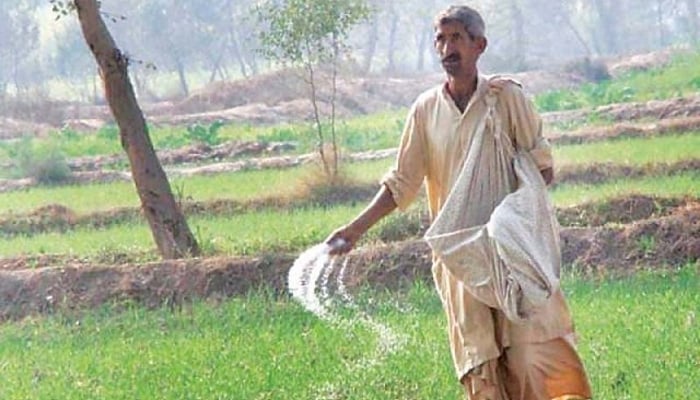ECC allows 100,000 tons urea import to bridge shortfall in rabi season
The Economic Coordination Committee (ECC) of the cabinet on Monday allowed 100,000 tons of urea import and decided to restore gas supply to two closed fertiliser plants to resume production.
ISLAMABAD: The Economic Coordination Committee (ECC) of the cabinet on Monday allowed 100,000 tons of urea import and decided to restore gas supply to two closed fertiliser plants to resume production.
The ECC took the decisions at a meeting presided by Finance Minister Asad Umar. The government decided to immediately make two local fertiliser plants operational, which will produce 79,000 tons/month. It also allowed 100,000 tons of urea import through the Trading Corporation of Pakistan.
Information Minister Fawad Chaudhry said the decisions were taken to give relief to farmers in rabi crops. Chaudhry told a news conference that the government would subsidise Rs960 to keep imported urea price at low level. Local urea price is currently at 1,615/bag and imported urea will cost Rs2,575/bag.
The minister said urea demand in the country currently stands at 5.833 million tons compared to 5.862 million tons a year ago. The fertiliser plants include Fatima Fertilizer Limited and Agri Tech (formerly Pak-American Fertilizers Limited). Fatima Fertilizer has gas demand of 44 million cubic feet/day (mmcfd) and its urea production capacity is 44,000 tons/month. Agri Tech’s gas requirement is 28.5 mmcfd and it could produce 35,000 tons/month urea.
Sources said the plants remained closed due to shortage of feedstock and high prices of gas. They have retrenched hundreds of their employees and some of them are working on half salaries, the sources added.
Officials, privy to the ECC meeting, told The News that the local gas would be supplied to the plants for the first two months and later they would be shifted to imported re-gasified liquefied natural gas (RLNG) at 50 percent of original tariff.
The officials said the government, after taking feedbacks from the ministries of industries, finance, food security and petroleum, decided to provide RLNG to the plants at subsidised tariff as the imported gas is expensive compared to the local substitute.
Currently, urea shortage has been felt in the market and its prices have increased which could cripple growth in the agriculture sector. Urea prices in the open market are increasing due to urea shortage and its price has jumped around Rs100/bag in the past one month.
In some areas, a urea bag is sold as high as Rs1,720/bag. Urea price was around Rs1,400/bag at the start of kharif (summer) season with key crops of sugarcane, cotton, maize and rice.
Agriculture experts said urea shortage might affect the summer crops as well as pose risks to the major crops of wheat, gram and lentil in the upcoming rabi (winter), starting in October.
In May 2017, the previous government allowed to double export of urea to 0.6 million tons due to its surplus inventory.
In August 2018, urea stock hit the lowest level of 87,000 tons, 12 percent less than the monthly demand. With the local production of 460,000 tons, the total urea availability in August was recorded at 547,000 tons as against the off-take of 620,000 tons, showing a shortfall of 73,000 tons.
-
 Savannah Guthrie Shares Sweet Childhood Video With Missing Mom Nancy: Watch
Savannah Guthrie Shares Sweet Childhood Video With Missing Mom Nancy: Watch -
 Over $1.5 Million Raised To Support Van Der Beek's Family
Over $1.5 Million Raised To Support Van Der Beek's Family -
 Diana Once Used Salad Dressing As A Weapon Against Charles: Inside Their Fight From A Staffers Eyes
Diana Once Used Salad Dressing As A Weapon Against Charles: Inside Their Fight From A Staffers Eyes -
 Paul Anthony Kelly Opens Up On 'nervousness' Of Playing JFK Jr.
Paul Anthony Kelly Opens Up On 'nervousness' Of Playing JFK Jr. -
 Video Of Brad Pitt, Tom Cruise 'fighting' Over Epstein Shocks Hollywood Fans
Video Of Brad Pitt, Tom Cruise 'fighting' Over Epstein Shocks Hollywood Fans -
 Jelly Roll's Wife Bunnie Xo Talks About His Huge Weight Loss
Jelly Roll's Wife Bunnie Xo Talks About His Huge Weight Loss -
 Margot Robbie Reveals Why She Clicked So Fast With Jacob Elordi
Margot Robbie Reveals Why She Clicked So Fast With Jacob Elordi -
 Piers Morgan Praised By Ukrainian President Over 'principled Stance' On Winter Olympics Controversy
Piers Morgan Praised By Ukrainian President Over 'principled Stance' On Winter Olympics Controversy -
 Halsey's Fiance Avan Jogia Shares Rare Update On Wedding Planning
Halsey's Fiance Avan Jogia Shares Rare Update On Wedding Planning -
 Instagram Head Adam Mosseri Says Users Cannot Be Clinically Addicted To App
Instagram Head Adam Mosseri Says Users Cannot Be Clinically Addicted To App -
 James Van Der Beek Was Working On THIS Secret Project Before Death
James Van Der Beek Was Working On THIS Secret Project Before Death -
 Las Vegas Father Shoots Daughter's Boyfriend, Then Calls Police Himself
Las Vegas Father Shoots Daughter's Boyfriend, Then Calls Police Himself -
 'Hunger Games' Star Jena Malone Shocks Fans With Huge Announcement
'Hunger Games' Star Jena Malone Shocks Fans With Huge Announcement -
 Ex-OpenAI Researcher Quits Over ChatGPT Ads
Ex-OpenAI Researcher Quits Over ChatGPT Ads -
 Prince William Criticized Over Indirect Epstein Connection
Prince William Criticized Over Indirect Epstein Connection -
 'Finding Her Edge' Creator Explains Likeness Between Show And Jane Austin Novel
'Finding Her Edge' Creator Explains Likeness Between Show And Jane Austin Novel




